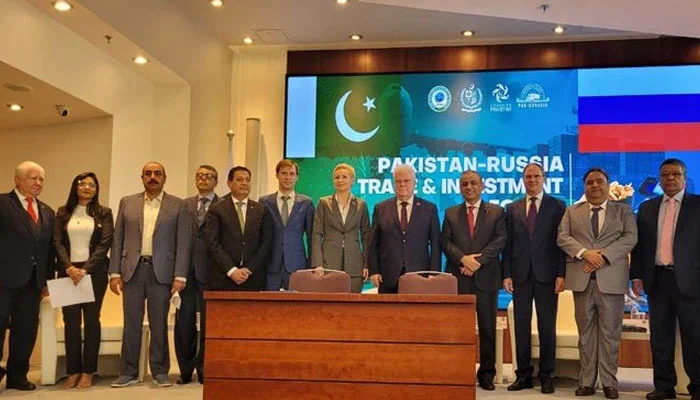Islamabad, Moscow— In a notable step towards strengthening bilateral trade relations, agricultural companies from Russia and Pakistan have signed barter agreements. These agreements aim to facilitate the exchange of goods between the two countries. The first-ever Pakistan-Russia Trade and Investment Forum held in Moscow announced the agreements.
Russian firm Astarta-Agrotrading will supply 20,000 tons of chickpeas to Pakistan’s Meskay & Femtee Trading Company in return for an equal quantity of rice. Additionally, Astarta will provide 15,000 tons of chickpeas and 10,000 tons of lentils. In exchange, it will receive 15,000 tons of mandarins and 10,000 tons of potatoes. These deals aim to address payment difficulties. These difficulties stem from Western sanctions imposed on Russia since its invasion of Ukraine in February 2022.
A Pakistani official, speaking at the forum, explained that the two companies opted for barter to navigate these payment challenges. This approach minimizes the need for cash transactions and reduces the visibility of trade flows to Western countries.
Federal Minister for Board of Investment, Privatization, and Communications Abdul Aleem Khan expressed confidence in Pakistan’s investment climate. He highlighted the country’s potential for joint ventures with Russia. Khan noted that the trade volume between Pakistan and Russia has exceeded $1 billion in the past year. This increase was facilitated by improved connectivity through a new Transportation Agreement.
Strengthened Trade Relations
During his address, Khan emphasized the significance of the forum. He noted its role in enhancing longstanding diplomatic and trade relations between the two countries. Khan pointed out that Pakistan aims to position itself as a hub for trade and transit. He advocated for improved visa regulations and reduced tariff and non-tariff barriers.
Khan also mentioned recent discussions between Russian President Vladimir Putin and Pakistan Prime Minister Mian Shehbaz Sharif. These discussions reinforced the commitment to fostering closer economic ties. He detailed the range of Pakistani exports to Russia, which include textiles, fruits, and surgical equipment. Khan also highlighted imports from Russia, such as crude oil and coal.
The forum saw participation from over 60 Pakistani companies showcasing various products and services, with a combined export value exceeding $500 million. On the Russian side, representatives from multiple government ministries and banks attended, exploring opportunities for collaboration.
Despite the enthusiasm surrounding the trade agreements, Pakistani businesses face challenges in executing transactions through traditional banking channels due to SWIFT sanctions affecting some Russian firms. Nevertheless, countries like India, the UAE, and China continue to engage with Russia amid similar restrictions.
Implications of the Pakistan-Russia Barter Trade Agreements
The barter agreements between Pakistan and Russia reflect a broader trend of countries seeking to circumvent Western sanctions and financial restrictions through alternative trade mechanisms. This strategy allows both nations to maintain and potentially expand their economic relations in the face of geopolitical challenges.
For Pakistan, the agreements provide a timely opportunity to diversify its trading partners and reduce reliance on traditional markets, especially in light of ongoing economic challenges at home. The focus on agricultural products is particularly significant, as it taps into Pakistan’s strengths in agriculture while addressing food security concerns within Russia.
Meanwhile, Russia’s shift towards barter trade indicates its adaptation to a changing global landscape where financial systems have become more isolated due to sanctions. By establishing these agreements, Russia is not only safeguarding its agricultural sector but also reinforcing its economic ties with Pakistan, which can be vital for both nations as they navigate the complexities of international trade.
However, the success of these agreements will hinge on how effectively both countries can manage logistical challenges. They must also build trust between their respective businesses. Additionally, reliance on barter trade may pose limitations on the growth of bilateral trade in the long term. This is especially true if market dynamics shift or if either country faces additional economic pressures. Ultimately, while these agreements represent a step forward, they highlight the precarious nature of international trade in a politically charged environment. Geopolitical realities can influence economic ties. Observers will closely watch the outcome of this partnership. It could serve as a model for other nations seeking similar arrangements amidst rising global tensions.



![Afghan men search for victims after a Pakistani air strike hit a residential area in the Girdi Kas village, Nangarhar province on February 22, 2026. [Aimal Zahir/AFP/Getty Images]](https://southasiatimes.org/wp-content/uploads/2026/02/gettyimages-2262391441.webp)


